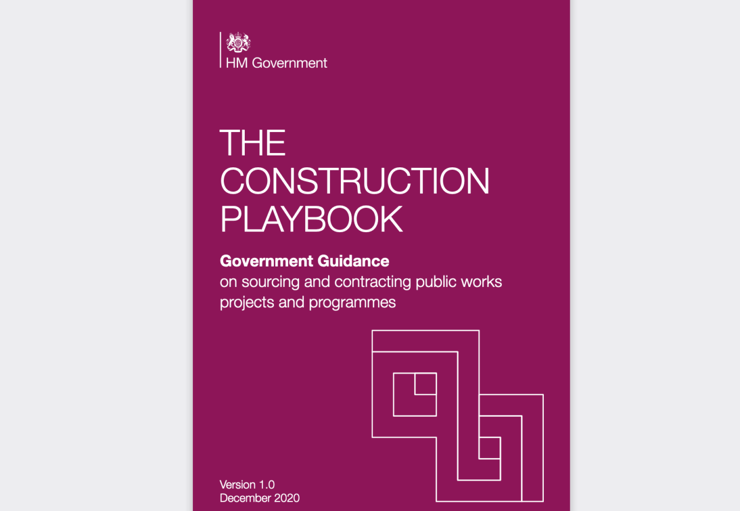
As I write this, we are in the middle of the third wave of the Covid-19 pandemic. The UK government is doing much to help the construction sector − including NEC users and other construction professionals − continue its critical role of safely sustaining and rebuilding the economy.
In January 2021, business energy and industrial strategy secretary Kwasi Kwarteng restated the government’s position that, ‘firms and tradespeople in the construction sector and its supply chain, including merchants, suppliers and product manufacturers, should continue to operate during this national lockdown… You are making a hugely valued and critical contribution to our country’.
At the same time the Construction Leadership Council published version 7 of Construction Sector – Site Operating Procedures: Protecting your Workforce During Coronavirus (Covid19) (CLC, 2021). This contained the latest government guidance for construction sites in England, including updated advice on selfisolation and shielding.
Construction Playbook published
A month earlier the government published its much-anticipated Construction Playbook (HM Government, 2020). This was the result of extensive collaboration from across the public and private sectors to bring together leading expertise and best practice. It builds on the November 2020 National Infrastructure Strategy (HM Treasury, 2020) and supports the government’s ambition to transform infrastructure networks over the next decade and beyond, helping NEC users and the rest of the construction industry build better, faster and greener.
The Playbook contains 14 policies that set out commercial best practice and reforms to how contracting authorities and consultants and contractors should work together. This includes letting longer-term contracts, adopting early supply chain involvement, focusing on desired outcomes, benchmarking, using digital technologies and allocating risk – all themes that will be familiar to most NEC users.
There is also a recommendation to assess complex projects using a ‘should cost’ model based on past project data. This is part of the government’s drive to achieve net zero carbon dioxide emissions by 2050 by looking at lifecycle costs rather than just capital build costs. It is very much aligned with the Playbook’s other recommendations around embedding digital technologies and driving forward a standard approach to building information modelling.
'The Construction Playbook builds on the November 2020 National Infrastructure Strategy and supports the government’s ambition to transform infrastructure networks over the next decade and beyond, helping NEC users and the rest of the construction industry build better, faster and greener.’
NEC4 part of the revolution
However, the Playbook is not the start of a new revolution. NEC users have long understood the challenges the construction industry has faced in recent years, both perceived and real, and many documents have been written which outline these shortfalls by both the public and private sectors.
Much work has already happened and will continue to happen to improve its processes. These include the introduction of the NEC4 suite of contracts, the emphasis on alliances and collaboration (such as the NEC4 Alliance Contract) and the move towards a greater use of modern methods of manufacture.
More recently the industry has had to face the challenges of the coronavirus and Britain’s exit from the European Union. The way NEC users and the rest of the construction industry has responded to the government’s call to continue working safely during the pandemic has been nothing less than impressive.
Prompt payment code
In all of this, NEC users should not lose their focus on ensuring they continue to pay suppliers in a timely manner. The January 2021 changes (BEIS, 2021) to the government’s Prompt Payment Code will support this. They include a new requirement for a company’s chief executive officer or finance director, or the business owner where it is a small business, to sign the code personally to ensure that responsibility for payment practices is taken at the highest level of an organisation.
The changes will come into force immediately. From 1 July 2021, signatories will be required to pay 95% of invoices from small businesses (those with fewer than 50 employees) within 30 days. The target for payment of invoices from larger businesses will remain 95% of invoices paid within 60 days.
All of this will help us to ensure that the construction industry remains relevant and rewarding for those already involved during these challenging times. It is a real opportunity for people looking to develop a career in construction as the industry leads society in achieving a zero-carbon and sustainable future.
References
BEIS (Department of Business, Energy & Industrial Strategy) (2021) Government tackles late payments to small firms to protect jobs, Press Release, https://www.gov. uk/government/news/government-tackleslate-payments-to-small-firms-to-protect-jobs
CLC (Construction Leadership Council) (2021) Construction Sector − Site Operating Procedures: Protecting Your Workforce During Coronavirus (Covid-19), Version 7 – 07 January 2021, https:// www.constructionleadershipcouncil.co.uk/ wp-content/uploads/2021/01/Site-OperatingProcedures-Version-7.pdf
HM Government (2020) The Construction Playbook, Government Guidance on sourcing and contracting public works, Cabinet Office, https://www.gov.uk/ government/publications/the-constructionplaybook
HM Treasury (2020) National Infrastructure Strategy: Fairer, faster, greener, https://www. gov.uk/government/publications/nationalinfrastructure-strategy.



